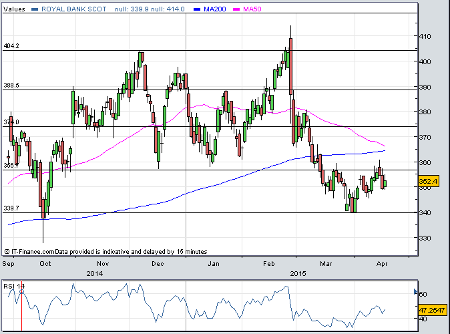Royal Bank of Scotland seen up 45%
20th April 2015 17:30
by Harriet Mann from interactive investor
Share on
The banks are still managing to divide opinion in the City. Just a fortnight after Investec told investors to keep at arms-length due to a few too many possible one-offs, broker Jefferies has warned that staying away from is likely to cost you.
Concerns about RBS centre around its corporate and institutional banking (CIB) restructuring, delayed capital return and its core earnings power. But despite the market's trepidation, Jefferies believes RBS is worth 510p per share, base case.
Restructuring its underperforming CIB division will involve exiting around two-thirds of the 38 countries it currently works in, and cutting risk-weighted assets (RWAs) by 60% from £107 billion to £35-£40 billion in 2019, including £25 billion this year. RBS has earmarked between £2.5 billion-£3.5 billion for the restructure, figures Jefferies calls "conservative" thanks to management's proven track record.
Although costs may last longer than first expected, the restructure should free-up £9 billion of excess capital in 2015 and £18 billion in 2017, which should eliminate any drag to rates of return in its core business, Jefferies' research team reckons.
Shareholders should also be rewarded with a 9p per share dividend in 2016 and an even larger share buy-back is expected to start later in 2015. Jefferies argues that only a minority really expected a return on capital in 2016 in the first place. So although charges may persist, the analysts doubt any real change has been felt.

(Click to enlarge)
Keeping its cost/income ratio below 50% is a key driver of improved earnings at RBS. Thanks to the £1.1 billion of cost cutting it has already secured and £1.1 billion it plans to deliver in 2015, RBS's medium-term cost/income ratio should remain below that ceiling, allowing it to generate earnings per share of 40p in 2017. Says the broker:
Given that RBS's core business units can operate on an estimated £27 billion of tangible capital and our 2017 estimate for group tangible capital is £45 billion, we calculate excess capital for the bank at £18 billion. And, this is after distributing an estimated 55% of earnings as dividends in each of 2016 and 2017. Discounting all of this back and assuming a 1.9x price/TBV multiple for the Core businesses, we arrive at 510p valuation for RBS.
With General Election nerves starting to hit the market, some investors want to see proof before they jump in. But Jefferies has a warning.
In short, we believe there is actually a cost of waiting given that the election is likely a transitory issue and that there are meaningful catalysts happening right now in the name (e.g. recent sale of CFG shares and likely underlying capital generation in Q1 15).
This article is for information and discussion purposes only and does not form a recommendation to invest or otherwise. The value of an investment may fall. The investments referred to in this article may not be suitable for all investors, and if in doubt, an investor should seek advice from a qualified investment adviser.